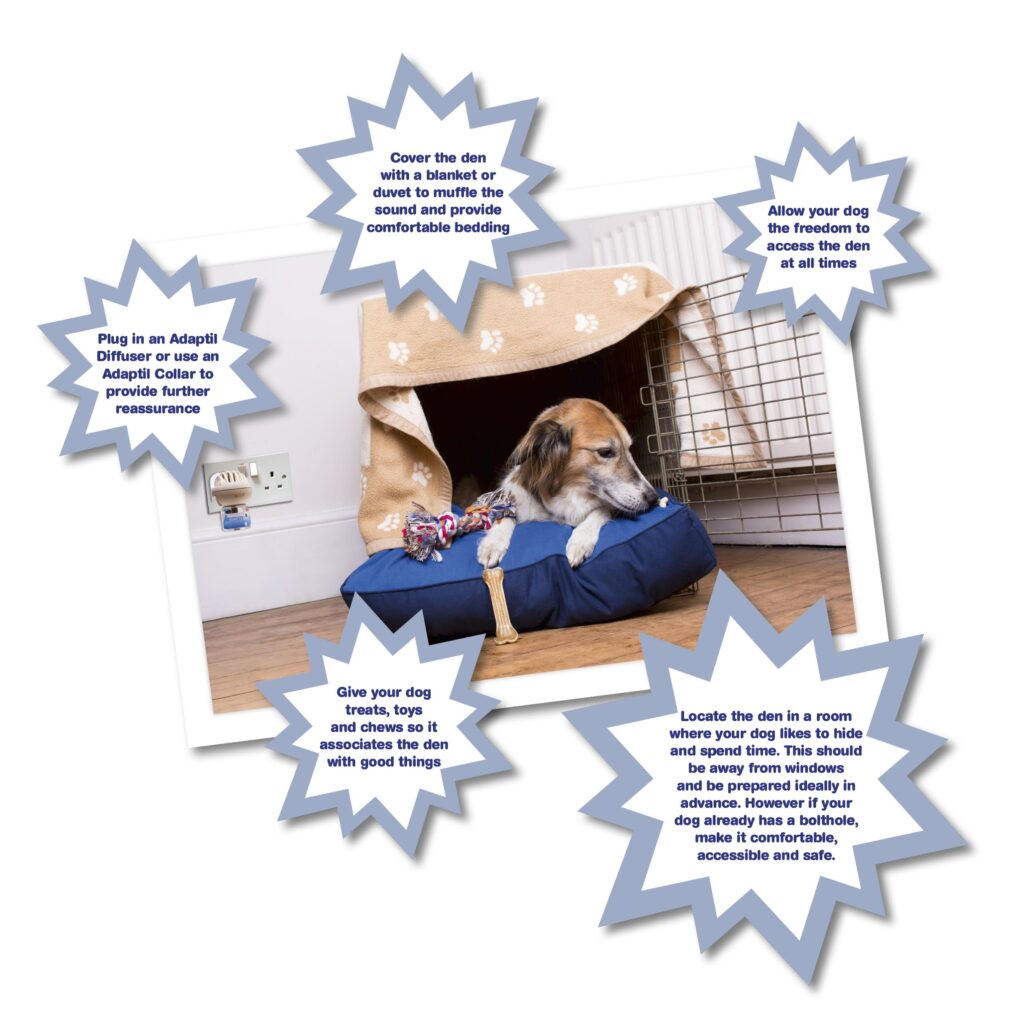A large percentage of dogs and less so of cats become stressed or fearful around Halloween as they are exposed to excess noise, excited children, costumes, visitors etc. This can also be a very stressful time for owners, many of whom are unaware as to how to help their pets. We have put a few tips together to help prepare for the coming season.
Signs of Anxiety in Dogs
Dogs with noise fears can exhibit some or all of these signs:
– Trembling or shaking
– Licking of lips
– Panting
– Chewing objects
– Clinging to owners
– Cowering & hiding
– Unable to settle
– Trying to dig
– Barking excessively
– Urinating or defecating indoors
How to help in the weeks before
The first step is to make preparations well in advance of Halloween.
Begin by ensuring your pet has a safe haven or a den to retreat to. This must be an area they feel secure in. It should ideally be an internal room, easily accessible at all times and away from windows or doors. The den can be a place that your pet already uses and is adapted to be comfortable, dark and quiet as possible. It could also be a manmade temporary option such as a cardboard box or crate.
Preparing a den in advance allows your pet to get used to the area and accept it as a safe place. Whatever format the den is, it is advisable to use towels and/or blankets to cover the area in order to dim the sounds and lights of the fireworks or bangers.
In dogs, the use of Adaptil has also been shown to be helpful with reducing anxiety. It is available in three forms; a diffuser, collar and a spray. It reduces the intensity of the dog’s fear response and should be used alongside other measures such as building a den. It is best to start using Adaptil in the run up to Halloween.
Cats
Cats are thought not to develop sound sensitivities as dogs do. However, they may be frightened by the loud bangs and flashes of fireworks. Keeping a cat indoors may help avoid stress from loud noise but the change in routine may cause the cat to become anxious and show unwanted behaviours such as urine marking, inter-cat tension and vertical scratching, so it can be a bit of a dilemma.
Ensure your cat has plenty of litter trays throughout the house and that there is a place to go where he/she feels safe. A safe place for a cat may be up high, such as on top of cupboards, or could be under a bed or in a box. Once the cat has found its safe place, leave it alone and do not coax it out.
In cats, the use of a Feliway diffuser may help to alleviate nervousness or tension.
Other useful tips
– Dogs that have shown signs of noise sensitivity in previous years, should be taken to the vet, to assess if medication would help them cope with the firework season
– Be aware that older dogs may find noises more challenging than in previous years as they start to find changes to routine difficult
– Keep pets indoors during Halloween and check the registered details of their microchip are up to date
– Soothing or punishing a dog may increase the intensity of the experience or reward inappropriate behaviour. Distracting them with a chew, toy, puzzle feeder or game may be helpful
– Feed dogs early in the evening as anxious dogs may not want to eat
– Ensure dogs have been taken out for a walk and to the toilet before it gets dark to avoid the need to be taken out later
– Ensure the dog has access to their water bowl at all time as anxious dogs can pant more
– Ensure windows, doors and cat flaps remain closed during the Halloween season to prevent them escaping and this will help to reduce noise also. Microchipping your pet and ensuring the details are registered with a recognised database can help in the event of your pet managing to escape.
– Keep curtains closed, have the TV or music on to help drown the noise and keep the dog company. Doors with glass panels can be covered with towels or blankets to block out the flashes
Prevention in puppies
Exposing puppies to different stimuli during the socialisation period i.e. the first year of life can help prevent fears in later life. There is a sounds recording available called Sounds Sociable which has a variety of noises a puppy may experience in adult life such as fireworks and thunderstorms. Exposing a puppy to these sounds gradually can help them associate these sounds with part of everyday life.
How to help small pets
Small animals and birds will also need to be treated with special care as they are easily frightened. Hutches, cages and enclosures should be brought in to a quiet room indoors, a garage or a shed. Provide them with extra bedding to allow them to burrow down and feel more secure. Aviaries should be covered with thick blankets to block out the sight and sound of the fireworks or bangers but care should be taken to ensure there is enough ventilation.
Halloween can be a difficult time for many pets but there is a lot that can be done to support them through this time. For further information, please phone or email City Vet on 061-419760.
